Source for random stuff relating to Korea- language, culture, history, and more! We upload first on our Instagram (@ddaome_kr_class) but our posts make it to Tumblr eventually :) Feel free to ask questions and we will try to answer them as best as we can!
Don't wanna be here? Send us removal request.
Text
Vocabulary_해양 생물 Marine Life






Here's a Korean vocabulary list on marine life!
Here's the link to the original instagram post.
#learn korean#study korean#korean vocab#한국어#한국어 공부#한국어 배우기#korean#language#vocabulary#korean vocabulary
13 notes
·
View notes
Text
Vocabulary_바닷가 beach






Here's a list of Korean vocabulary matching the theme "beach"! As always, here's the link to our original instagram post. We post first on instagram, so follow us there if you want the latest updates :)
#learn korean#study korean#korean vocab#한국어#한국어 공부#한국어 배우기#korea#korean#language#Korean vocabulary#vocabulary
15 notes
·
View notes
Text
Korean Homonyms_다리




Link to our original instagram post
#learn korean#study korean#korean vocab#한국어 공부#한국어 배우기#korea#korean#한국어#language#Korean Vocabulary#Homonyms#Vocabulary
8 notes
·
View notes
Text
Korean Homonyms_차다







Here's the link to our instagram post.
#learn korean#study korean#korean vocab#korea#korean#한국어#한국어 공부#한국어 배우기#language#Korean Vocabulary#vocabulary#homonyms
21 notes
·
View notes
Text
Vocabulary_개강/개학 back to school






Here's a vocab list, and the theme is back to school! I admit.. This was supposed to be uploaded in September, many apologies for the delay...
Here's the link to the original instagram post!
#learn korean#study korean#korean vocab#한국어#한국어 공부#한국어 배우기#korea#korean#language#vocabulary#korean vocabulary
10 notes
·
View notes
Text
Vocabulary_새 Birds

☁️🐦 Birds(새) in Korean 🐦☁️
🐓 수탉 [su-tak] Rooster 🐤 병아리 [byeong-a-ri] Chick 🦃 ��면조 [chil-myeon-jo] Turkey 🕊 비둘기 [bi-dul-gi] Pigeon/Dove 🦅 독수리 [dok-su-ri] Eagle 🦆 오리 [o-ri] Duck 🪿 거위 [geo-wi] Goose 🦢 백조 [baek-jo] Swan 🦉 부엉이 [bu-eong-i] Owl 🦩 홍학 [hong-hak] Flamingo 🦚 공작새 [gong-jak-sae] Peacock 🦜 앵무새 [aeng-mu-sae] Parrot 🐧 펭귄 [peng-gwin] Penguin
Additionally, Hanja 조(鳥) means bird!
Here's the link to our instagram post.
8 notes
·
View notes
Text
Korean Homonyms_묻다







Here's the link to our instagram post.
#korean vocab#study korean#learn korean#한국어#한국어 공부#한국어 배우기#language#hangul#Korean vocabulary#vocabulary#homonyms#korea
5 notes
·
View notes
Text
Nobel Prize Winner, Han Kang





Here's a brief post about the first Korean to win a Nobel Prize for literature, Han Kang!
Credits/sources: First image from NobelPrize.org (Han Kang-Facts): https://www.nobelprize.org/prizes/literature/2024/han/facts/ Second Image from Kyobo books: https://www.kyobobook.co.kr/service/profile/information?chrcCode=1000646901 Quotes from Han Kang's works (Human Acts and The Vegetarian)
#learn korean#한국어#한국어 공부#한국어 배우기#korea#korean#korean literature#Korea#literature#korean culture#korean history
6 notes
·
View notes
Text
수능 CSAT (College Scholastic Ability Test) in Korea
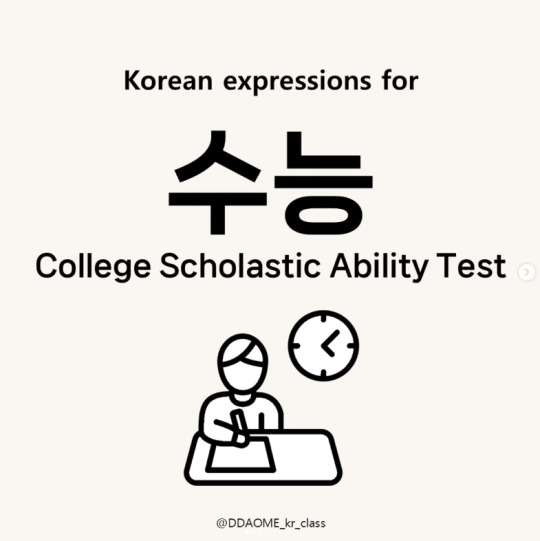

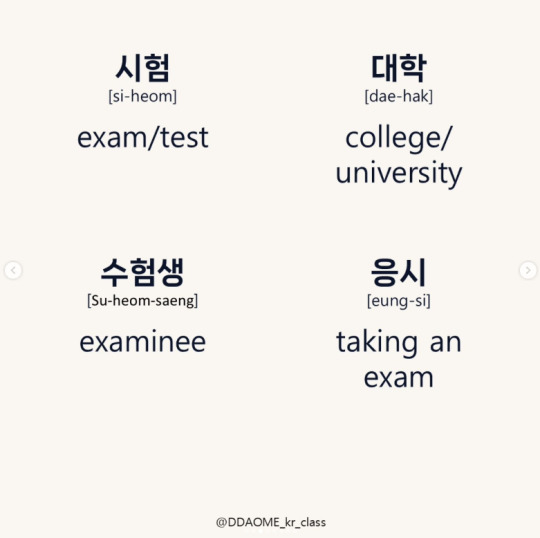
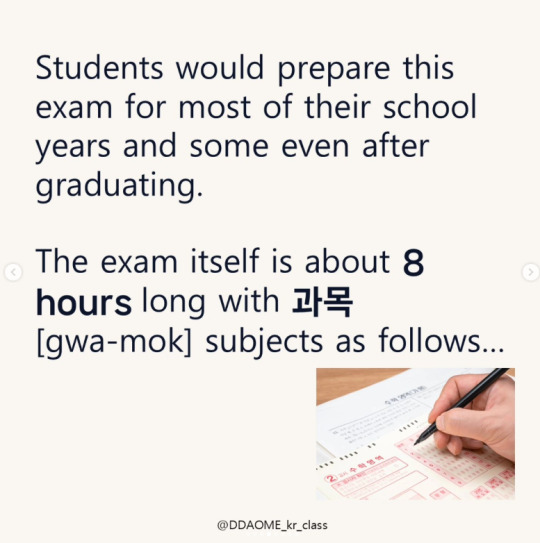
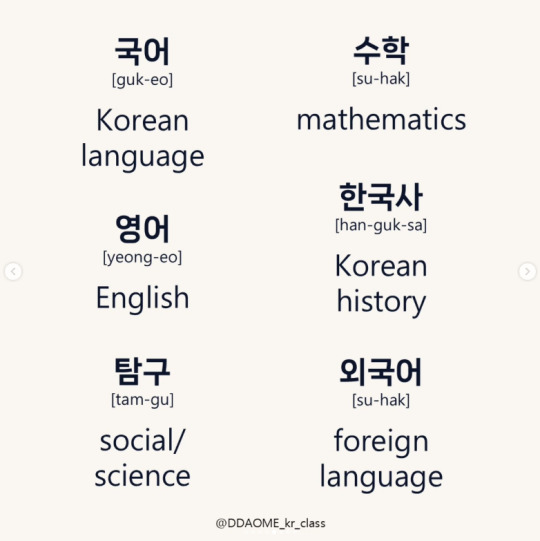
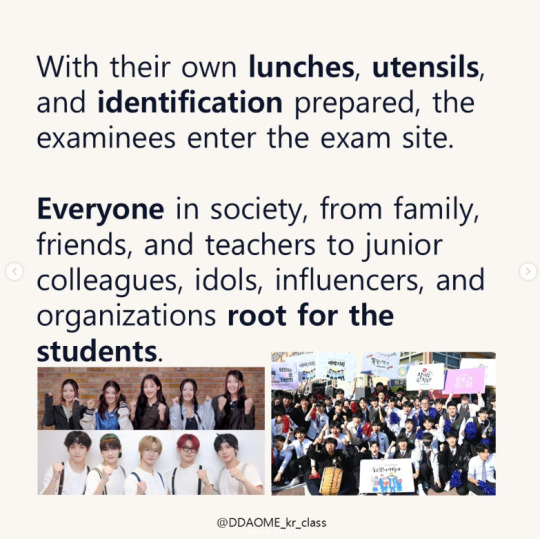
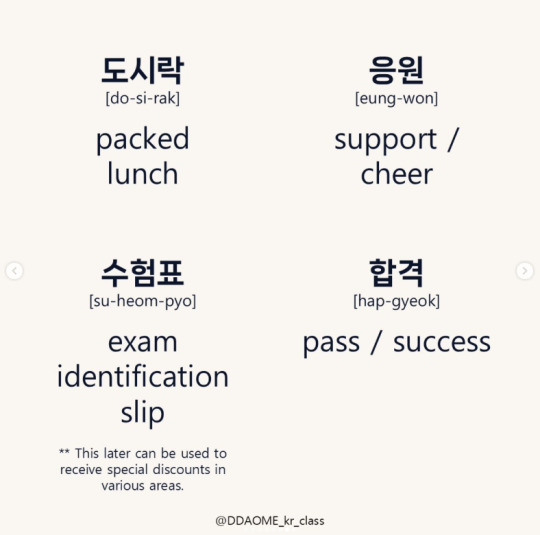

Did you know? Today (11/14) was the day of the CSAT in Korea, the test all students take in order to go to college. It's almost a nation-wide event, as everyone makes sure the students who have prepared for this exam for their entire school days can take the test without any interruptions!
#study korean#korean vocab#learn korean#한국어#한국어 공부#한국어 배우기#korea#korean#language#hangul#korean culture#Korean life#South Korea#수능#대학수학능력시험#vocabulary#korean vocabulary
12 notes
·
View notes
Text
한글날 Hangul Day







Happy Hangul Day everyone!
Today is October 9th in Korea, a public holiday called Hangul Day(한글날) commemorating the creation of Hangul, the Korean alphabet. We can all thank the great King Sejong for inventing the creative and easy-to-learn writing system that still benefits all the Korean people and Korean learners out there.
We have some vocabulary and information about the holiday and Hangul (or Hunminjeongeum) in this post, so we hope you enjoy!
*Icon Credits: Icon made by Freepik from www.flaticon.com Icon made by rizal2109 from www.flaticon.com
#한국어#한국어 공부#한국어 배우기#korea#learn korean#study korean#korean vocab#korean#language#hangul#hangul day#한글날#king sejong#korean vocabulary#korean langblr
12 notes
·
View notes
Text
반드시 vs 반듯이




🔶️ 반드시 vs 반듯이 반드시 and 반듯이 are both adverbs and pronounced exactly the same! However, they have very different meanings
🔸️ 반드시 Adv. No matter what; Certainly Synonym: 기필코, 필히, 틀림없이, 꼭
방문 전에 반드시 예약을 해야 한다. You must make a reservation before visiting.
🔸️ 반듯이 Adv. Small objects, thoughts, actions being not crooked, tilted, or bent; Straight Synonym: 반듯하게(conjugation of 반듯하다), 똑바로
나는 요가 매트 위에 반듯이 누웠다. I lay on my back(straight and neatly) on the yoga mat.
Here's a quiz to help your learning! Answers are below the read more line :) Here's the link to our instagram post.
<Quiz> ▪️중요한 약속이니까 _____ 시간에 맞춰서 와야 합니다. ▪️허리를 _____ 펴고 바른 자세로 앉아 보세요.
Answers:
중요한 약속이니까 반드시 시간에 맞춰서 와야 합니다. (Since it's an important meeting, you must be on time.)
허리를 반듯이 펴고 바른 자세로 앉아 보세요. (Try sitting with your back straight and your posture correct.)
#study korean#learn korean#korean vocab#korean#한국어 공부#한국어 배우기#한국어#Korean vocab#Korean language#learning korean#vocabulary#language
13 notes
·
View notes
Text
Korean Vocab_ Common Places 🏠







편의점: convenience store
슈퍼/마트/슈퍼마켓: grocery store
빵집: bakery
지하철 역: subway station
도서관: library
아파트: apartment
시청: city hall
구청: gu office (“구” is a lower level of administration than 시, which is city)
For example, for Seoul it’s 시청 (서울 시청), but for gangnamgu, a area within Seoul, it’s 강남구청.
On an even lower level there are 주민센터, and there can be more than one 주민센터 within one 구.
학교: school
초등/중/고등/대: elementary/middle/high/university
상가: shopping district/shopping center
백화점: department store
은행: bank
우체국: post office
미용실: hairdresser/beauty salon
병원: hospital
약국: pharmacy
카페: cafe
식당/음���점: restaurant
학원: academy (private educational institutes)
호텔: hotel
공원: park
놀이터: playground
경찰서: police station
소방서: fire station
🏠Image Credits:
-icon made by surang from www.flaticon.com
#study korean#learn korean#한국어#korean vocab#한국어 공부#한국어 배우기#hangul#language#Korean vocabulary#vocabulary#한국어 공부하기#Korean language
18 notes
·
View notes
Text
쫓다 vs 좇다-
Sometimes even Koreans make mistakes of using 쫓다 in places of 좇다, but there are differences! Read more to find out the difference between these two similar words :)




Basically,
🔸️쫓다 - To rush after something in order to catch or meet an object - 쫓다 is chasing something physical - Used with words like 술래(tagger), 추격전(chase), 사냥꾼(hunter)
🔸️좇다 - To pursue goals, ideals, happiness, etc. - 좇다 is chasing something abstract - Used with words like 목표(goal), 이상(ideal), 명예(honor), 행복(happiness)
Try out the quiz! click the read more to see the answers to the quiz :) As always, here's a link to our instagram post. We upload first on instagram, so if you want the latest posts from us, consider following us on instagram as well :)
Answers:
축구 선수가 축구공을 쫓는다. (The soccer player chases after the soccer ball.) 그는 꿈을 좇아 열심히 연습하는 배우이다. (He is an actor who practices hard chasing his dream.)
#study korean#learn korean#korean vocab#korean#한국어 공부#한국어 배우기#한국어#hangul#language#langblr#Korean langblr#한국어 공부하기#Korean language
41 notes
·
View notes
Text
🏃♂️Suffix -하다






click the read more for a more detailed explanation :) Here's the link to our instagram post!
When you learn Korean, you may come across the word “하다” a lot. However, you may find that sometimes it works as a verb by itself while others seem combined with other words.
하다 is usually used as a verb, meaning “to do something”.
나는 매일 운동을 한다. (I exercise every day.)
나는 어제 공부를 열심히 했다. (I studied very hard yesterday)
To translate more literally word-by-word, the sentences above would look a bit more like “I do exercise every day” or “I did study very hard yesterday”.
However, you can also combine -하다 as a suffix to nouns to make various verbs and adjectives. Basically, -하다 can make nouns into something that has the quality of a verb, which can become a predicate.
Examples for -하다 verbs: 비행하다, 공부하다, 노래하다, 집중하다, 사랑하다
Examples for -하다 adjectives: 건강하다, 순수하다, 중요하다, 유용하다, 가난하다
(check the images above for each meaning and pronunciation!)
So what is the difference between a verb and an adjective in Korean? Well, adjectives, or 형용사, in Korean, aren’t very similar to adjectives in English, which usually refers to words used to describe nouns. In Korean, 형용사, or adjective describes the state or condition of the subject. If you check the meanings for the -하다 adjectives in the images above, you will notice most of them start with “to be”, which is the main difference between the verbs.
A commonly known adjective would be “��쁘다”, which means “pretty” (to be pretty). While both can be conjugated and act as predicates in a sentence there are some key grammatical differences, which is why in Korean we differentiate these two parts of speech. For example, adjectives cannot combine with the word ending -ㄴ다 (present tense ending).
Example:
나는 공부한다. (I study) (O)
나는 예쁘다 (I am pretty) (O) / 나는 예쁜다 (X)
-하다 not only combines with nouns but can also be combined with adverbs or onomatopoeic words, and sometimes other words as well. It even combines with certain dependent nouns too!
하다 as a verb also has many more meanings than just doing something, and it is an extremely versatile word. It can mean “to make” or “to dress/wear” in certain contexts, or could even refer to causation. It’s also used as another auxiliary/assistant verb (보조 동사), usually as the form -게 하다, which makes causatives(사동 표현). However, these are more advanced uses and aren’t the focus of this post, but perhaps in the future we can dive deeper into the various uses of the word “하다”.
Additionally, if you are an advanced learner and know quite a lot about Korean grammar, you may be questioning whether -하다 itself is a suffix or -하- is the suffix while -다 should be seen as a simple ending (종결어미). After all, when you conjugate -하다 words like 공부하다 into 공부하니, 공부하여, you will find that -하- is the suffix adding the new meaning while -다 is just the ending for the base form.
According to 국립국어원(the National Institute of Korean language) -하- is the suffix that makes nouns into verbs while -다 is an ending, but sometimes dictionaries such as the 표준국어대사전 mark it as -하다 (the whole) as a suffix which can be a source of confusion. Since I didn’t want to explain too much about the grammar behind the conjugation of endings, I simply referred to the suffix as -하다 in this post. Of course, this distinction does not have much use for foreigners learning Korean but may be an interesting tidbit for advanced learners or native speakers who are interested in advanced grammar!
Thank you for reading! Please leave a like and reblog if you enjoyed :)
5 notes
·
View notes
Text
Korean Vocab _ Body Parts 신체 부위






머리: head 얼굴: face 눈: eyes 눈썹: eyebrows 코: nose 입: mouth 귀: ears 목: neck 어깨: shoulders 팔: arms 손: hands 손가락: finger 가슴: chest/breast 배: stomach/abdomen 허리: waist 등: back 다리: legs 무릎: knee 종아리: calves 발목: ankle 발: foot 발가락: toes
🤸♀️As always, here's a link to our instagram post!
*icon credits: Icon made by freepik from www.flaticon.com
#learn korean#study korean#한국어#korean vocab#한국어 공부#한국어 배우기#hangul#language#Vocabulary#vocab#langblr#language study
104 notes
·
View notes
Text
🎈North Korean Balloons
If you have been in Korea recently, there are chances that you may have witnessed a giant balloon from our Northern neighbors- filled with trash, of course. Here's a short post about these balloons and a short word list that fits the theme for today!





If you were in Korea between May and August, you would have received an alert that would have looked similar to this:
[Emergency Alert]
At 7/24(Wed), unidentified materials, which are speculated to be North Korean Waste, were located near XXX area. Please contact the nearby army station upon notice if you see one.
From May 28th to August, North Korea has released balloons a total of 12 times, amassing over 1000 balloons dispatched to the South. The balloon, which carries all kinds of trash from tattered clothing to human waste, was spread through the northern part of South Korea. Seoul, the capital city of Korea, was no exception to this sudden action as well. Such balloons were spotted near the Congress and even at the presidential residence of president Yoon.
While it is speculated that such acts by North Korea was an act of retaliation toward the South Korean government upon allowing various organizations(especially those who are North Korean refugees, 탈북민[Tal-Bok-Min] in Korean) who sent anti-government leaflets and materials to North Korea, the specific reasons to such activities remain unknown at this time.
Followed by this occurrence, the ministry of Unification(통일부[Tong-Il-bu]) released a unique statement regarding the specifics of the balloons. Upon analysis of the materials that were inside, it was revealed that the majority of the rubbish was “curated trash,” which consisted of paper, clothing and vinyl that were cut in an identical size each.
The few pieces of actual trash provided some insight into the current circumstances inside North Korea. Socks and clothing, which were found to be repaired multiple times, added strength to the claims which argued people in North Korea, especially after the COVID-19, were facing severe strains in daily life.
At the same time, tattered pieces of Kim-Jeong-Un and North Korean propaganda pamphlets were also found in the waste as well. With such acts being punishable up to 20 years in North Korea, such evidence opens many windows to inspecting the circumstances in North Korea.
4 notes
·
View notes
Text
광복절_National Liberation Day of Korea
Hi everyone! This was supposed to be uploaded on the 15th of August... Unfortunately while I queued the post on Instagram I completely forgot to upload the draft on tumblr 😭Many apologies! Though it is sort of late... We hope you enjoy this short vocab list celebrating 광복절!






*image/icon credits:
Icon made by frdmn from www.flaticon.com Image of 1945 independence day: By 미상 - KBS 스페셜 8.15 광복특집 - 기억의 재구성, 퍼블릭 도메인, https://commons.wikimedia.org/w/index.php?curid=5780105
8 notes
·
View notes